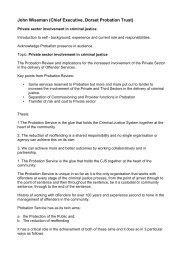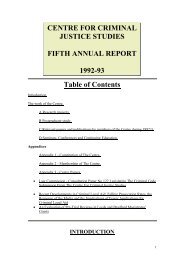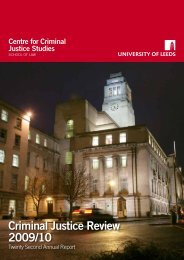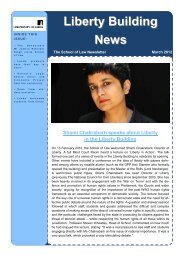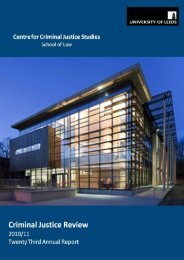Presentation by Adam Crawford - University of Leeds
Presentation by Adam Crawford - University of Leeds
Presentation by Adam Crawford - University of Leeds
Create successful ePaper yourself
Turn your PDF publications into a flip-book with our unique Google optimized e-Paper software.
Building Sustainable Societies<br />
‘PCCs and the<br />
Future <strong>of</strong><br />
Public/Private<br />
Policing<br />
Relations’<br />
<strong>Adam</strong> <strong>Crawford</strong><br />
<strong>University</strong> <strong>of</strong> <strong>Leeds</strong>
Phases <strong>of</strong> Public/Private Relations<br />
240,000<br />
220,000<br />
Total Police Employees<br />
England & Wales<br />
200,000<br />
180,000<br />
160,000<br />
140,000<br />
Phase I –<br />
Expanding<br />
public<br />
provision<br />
Phase II –<br />
Contracting<br />
public<br />
provision<br />
Sworn <strong>of</strong>ficers and<br />
CSOs England & Wales<br />
HMIC Projections<br />
120,000<br />
HMIC Projections<br />
100,000<br />
Private<br />
Security<br />
Industry Act<br />
Police<br />
Reform<br />
Act<br />
Banking<br />
crisis<br />
Comprehensive<br />
Spending<br />
Review
1. Expansion up to 2009/10<br />
Ebullient Public Police<br />
• Expanding public provision – police numbers;<br />
• New police ‘commodity’ – PCSO - to compete in<br />
market for visible patrols;<br />
• Private security industry relatively immature<br />
– price over quality;<br />
– short-term security contracts and staff ‘churn’;<br />
– preoccupied with regulation/legitimacy; 2001 Act.<br />
• Lack <strong>of</strong> coordination, hostility and a deficit <strong>of</strong><br />
trust <strong>by</strong> the police in the private security sector.<br />
• Weak accountability and segmented regulation.
2. Retrenchment from 2009/10<br />
By the time <strong>of</strong> the Comprehensive Spending Review 2010:<br />
• Britain had a more mature, self-confident and assertive<br />
private security industry – post-SIA.<br />
• Declining police budgets.<br />
• The political shibboleth <strong>of</strong> <strong>of</strong>ficer numbers abandoned <strong>by</strong><br />
Coalition Government - police numbers will be allowed to fall.<br />
• The spectre <strong>of</strong> ‘external’ democratic control – the advent <strong>of</strong><br />
Police and Crime Commissioners (PCCs).<br />
• Shift in the attitude <strong>of</strong> police managers:<br />
private sector no longer a ‘threat’ to,<br />
but rather a saviour!
Privatisation<br />
In June 2012, David Taylor-Smith, head <strong>of</strong> G4S for the UK and<br />
Africa, predicted that private companies would be running large<br />
parts <strong>of</strong> the British police service within five years driven <strong>by</strong> a<br />
combination <strong>of</strong> ‘budgetary pressure and political will’.<br />
He added:<br />
‘We have been long-term optimistic about the police and short-to-mediumterm<br />
pessimistic about the police for many years. Our view was, look, we would<br />
never try to take away core policing functions from the police but for a number<br />
<strong>of</strong> years it has been absolutely clear as day to us – and to others – that the<br />
configuration <strong>of</strong> the police in the UK is just simply not as effective and as<br />
efficient as it could be… I have always found it somewhere between patronising<br />
and insulting the notion that the public sector has an exclusive franchise on<br />
some ethos, spirit, morality – it is just nonsense … we employ 675,000 people<br />
and they are primarily motivated <strong>by</strong> pretty much the same as would motivate<br />
someone in the public sector.’
Business Partnering for Police<br />
=> Train hits the buffers
PCC Elections<br />
APCC Wordle
Electoral Statements<br />
Views on Privatisation in PCC Candidates’ Election Statements<br />
50<br />
45<br />
40<br />
35<br />
30<br />
25<br />
20<br />
15<br />
Anti-Privatisation<br />
Equivocal<br />
Pro-Privatisation<br />
No Comment<br />
10<br />
5<br />
0<br />
Labour Conservative Liberal<br />
Democrat<br />
UKIP<br />
Independent
PCCs Electoral Statements<br />
Elected PCCs Statements on Privatisation<br />
18<br />
16<br />
14<br />
12<br />
10<br />
8<br />
6<br />
No Comment<br />
Pro-Privatisation<br />
Anti-Privatisation<br />
4<br />
2<br />
0<br />
Conservative Labour Independent
PCC Election Results:<br />
The patchwork<br />
political map -<br />
41 test-beds <strong>of</strong><br />
experimentation
West Midlands PCC<br />
• The first act that the successful West Midlands PCC initiated on<br />
taking up the role on 22 November 2012 was to announce his<br />
intention to halt the privatisation <strong>of</strong> core police services.<br />
Bob Jones announced:<br />
‘It is also significant that what I am about to announce is my first<br />
decision since taking up <strong>of</strong>fice. This attests to the importance I attach<br />
to giving clarity to the public and, equally as importantly, to the<br />
<strong>of</strong>ficers and staff <strong>of</strong> the Force on the future <strong>of</strong> the Programme. My<br />
decision is that the Business Partnering Programme will cease’.
Market Pressures<br />
• The pressure on PCCs to experiment with private sector<br />
involvement/Business partnerships given challenges to cut<br />
millions <strong>of</strong> pounds from police budgets is likely to be intense.<br />
• Shortly after the elections, it was reported that security firms had<br />
launched a lob<strong>by</strong>ing campaign targeting newly elected PCCs.<br />
• In an interview with the Independent, the Steria UK chief<br />
executive John Torrie, said <strong>of</strong> the approach taken <strong>by</strong> security,<br />
technology and outsourcing companies:<br />
‘Some <strong>of</strong> the people in there at the present moment are new into this<br />
market and they see it as a potentially huge market. They've<br />
recruited big forces <strong>of</strong> people and they will be all over the police<br />
market like a rash.’ (cited in Peachey 2012)
The Extended Policing Family<br />
• Fragmented relations between plural policing providers. Further<br />
fragmentation with market sub-contracting<br />
• Segmented regimes and forms <strong>of</strong> regulation and oversight –<br />
proposed reform <strong>of</strong> private security industry regulation (2012).<br />
• Promiscuous role <strong>of</strong> PCCs<br />
• Police and Crime Commissioners!<br />
• Possibilities for PCCs to join-up and coordinate policing – not<br />
simply the police Community Safety Budgets.<br />
• Coalition govt narrowing <strong>of</strong> the police mission – a return to police<br />
priorities dominating policing and community safety
• We stand on the brink <strong>of</strong> a new dawn for relations between<br />
private security and public police in Britain… and beyond<br />
• The confluence <strong>of</strong> ‘electoral accountability’ and ‘fiscal restraint’<br />
may be a volatile mix given the insatiable public expectations<br />
and demands for public policing.<br />
• The conceptual parameters for thinking about the public goals<br />
and interests served <strong>by</strong> private providers <strong>of</strong> policing and the<br />
private/parochial nature <strong>of</strong> public policing may be on the table!<br />
• Fundamentally, these issues will (should) engage police<br />
managers and local citizens in essential questions about the<br />
function and purpose <strong>of</strong> police (and policing) in a modern<br />
society.






